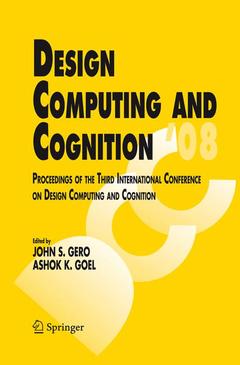Design Computing and Cognition '08, 2008 Proceedings of the Third International Conference on Design Computing and Cognition

JOHN GERO is a Research Professor at the Krasnow Institute of Advanced Study and at the Volgenau School of Information Technology and Engineering, George Mason University and a Visiting Professor at the Massachusetts Institute of Technology. Formerly he was Professor of Design Science and Co-Director of the Key Centre of Design Computing and Cognition, at the University of Sydney. He is the author or editor of 43 books and over 550 papers in the fields of design science, design computing, artificial intelligence, computer-aided design, design cognition and cognitive science. He has been a Visiting Professor of Architecture, Civil Engineering, Mechanical Engineering, Computer Science or Cognitive Science at MIT, UC-Berkeley, UCLA, Columbia and CMU in the USA, at Strathclyde and Loughborough in the UK, at INSA-Lyon and Provence in France and at EPFL-Lausanne in Switzerland. His former doctoral students are professors in the USA, UK, Australia, India, Japan, Korea, Singapore and Taiwan.
He has been the recipient of many excellence awards including the Harkness Fellowship, two Fulbright Fellowships, two SRC Fellowships and various named chairs. He is on the editorial boards of numerous journals related to design science, computer-aided design, artificial intelligence and knowledge engineering and is the chair of the international conference series Artificial Intelligence in Design, the new conference series Design Computing and Cognition and the international conference series Computational Models of Creative Design.
Date de parution : 09-2014
Ouvrage de 736 p.
15.5x23.5 cm
Date de parution : 09-2008
Ouvrage de 736 p.
15.5x23.5 cm
Thèmes de Design Computing and Cognition '08 :
Mots-clés :
3D; Archive; algorithms; architecture; artificial intelligence; communication; complexity; design; information system; layout; ontology; optimization; sketch; sketching; visualization



